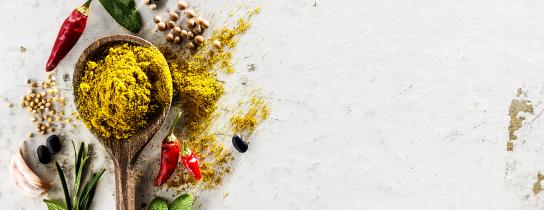
An Integrative Medicine Guide to Herbs for Fortifying Your Immune System
Winter’s here, a season that brings the beauty of snow fall paired with an increased chance of getting sick. Although the cold weather does us a favor by killing off disease-causing microorganisms and vectors, it does bring the onset of seasonal viruses. In addition, people tend to be less active as they were in warmer seasons, and their vitamin D levels are not as high as during summer which contributes to dampening of the immune system.
Integrative Medicine suggests the key to strengthening your immune system is to live a healthy lifestyle with the right kind of foods, lots of movement, and a healthy sense of mind, heart and spirit. Mother nature, however, has been kind enough to provide herbs that can help support us as well. Some plants are known to be immune modulators that help support the immune system during stress. Others are considered adaptogens which builds our resistance to physical, chemical, and biological stress. The following are my five favorites when it comes to plants that are immune modulators and adaptogens which can be useful during this time of the year:
Echinacea is something I recommend having stocked up in the house all year round. The roots of Echinacea angustifolia have been shown to shorten the duration of cold symptoms. A study on Echinacea purpura showed a statistically significant decrease in symptoms versus a placebo. It is best to use the tincture (an extract in an alcohol solution) as most of these studies used. The sooner you start taking the extract (taken every 3-4 hours) when the first symptoms of a cold starts, the more effective it will be in shortening the duration of the illness. Use it only for the first 72 hours because beyond that it loses its effects.
Goldenseal root (Hydrastis canadensis) is often added to Echinacea as a tincture and is traditionally used for gastritis as it is known to be bactericidal to H. pylori. However outside of the GI tract, it is useful for lung infections as well as urinary tract infections.
Astragalus root (also called huang qi) is an immune system modulator and is preventative for those who suffer recurrent acute infections or chronic infections. You can use 20-30 grams of dried astragalus root boiled, and the decoction used daily to help ward off infections.
Panax ginseng or Panax quinquefolius are adaptogens and traditionally have been used for recovering from illness and improving immune function. They both can be taken as an extract or tincture and also have a calming effect which helps with anxiety. Studies suggest that these adaptogens shorten the duration of the common cold when taken preventatively for several weeks.
Peppermint, particularly the essential oil, has been used as a decongestant. You can use it as chest rub, add it to steamy water as an inhalant, or use in a diffuser as aromatherapy. If you have asthma, be mindful of sensitivity.
The use of herbs is one way Integrative Medicine combines the best of conventional medicine with healing sciences from other traditions. Considering the totality of the patient, the goal is to create a healthy lifestyle in mind, body, and spirit. Consider implementing these Integrative Medicine practices this winter and help your body combat sickness before it even starts!
Note: These herbs do not replace conventional therapies such as antibiotics if clearly indicated and prescribed by your physician. Always let your doctor know if you are taking any herbal or dietary supplements.
Eduardo Pinto, MD, is an Integrative Medicine practitioner who sees patients twice a month at the Newburgh office. Integrative Medicine is an approach to care that considers the totality of the patient, while trusting the innate capacity of the person to heal, and collaborating with the patient towards health and wellness. It combines the best of conventional medicine and other healing traditions without abandoning good science. It focuses on prevention through lifestyle changes, stress management, nutrition, and movement.

 Optum Radiology at Crystal Run Healthcare
Optum Radiology at Crystal Run Healthcare Request medical records online
Request medical records online